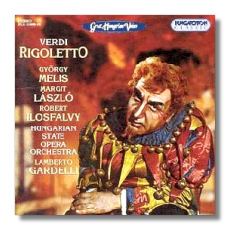
The Internet's Premier Classical Music Source
Related Links
- Verdi Reviews
- Latest Reviews
- More Reviews
-
By Composer
-
Collections
DVD & Blu-ray
Books
Concert Reviews
Articles/Interviews
Software
Audio
Search Amazon
Recommended Links
Site News
 CD Review
CD Review
Giuseppe Verdi

Rigoletto
(Sung in Hungarian)
- Róbert Ilosfalvy, tenor (Duke)
- Margit László, soprano (Gilda)
- György Melis, baritone (Rigoletto)
- Zsuzsa Barlay, alto (Maddalena)
- József Bódy, bass (Sparafucile)
Hungarian State Opera Orchestra & Chorus/Lamberto Gardelli
Hungaroton Classic HCD31808-09 ADD 2CDs 52:18, 60:04
Rigoletto in Hungarian? Well, why not? This is part of Hungaroton's "Great Hungarian Voices" series, and it does give us an opportunity to see who some of that country's operatic stars were, circa 1965. Another reason to be interested is the conductor. From long experience, Lamberto Gardelli knew how Verdi's music should go, and any recording that has his name on it is bound to be solidly constructed. (Over decades, he frequently visited Budapest and supported Hungarian singers, such as soprano Sylvia Sass.)
It has been said that Verdi in English can sound like Gilbert and Sullivan. Verdi in Hungarian sounds like, well, Verdi in Hungarian. (I have very few points of reference here!) One lesson to be learned from performances and recordings of Verdi in "the wrong language" is that Verdi's musical language exists in partnership with the Italian language itself. When his operas are sung in any other language, the shift in vowels, consonants, and rhythms changes the character of the music. Hungarian's many covered vowels tend to make Verdi sound like a flannel jacket instead of a brilliantly colored tunic. The difference is striking.
Tenor Róbert Ilosfalvy, who sings the role of the Duke, is the standout singer here. (I believe he made at least occasional appearances in North America.) He sounds like a lyric tenor who could push into more heroic territory. The singer he most reminds me of is Nicolai Gedda. He's outgoing and appealing, and he would be enjoyed on any stage. Margit László seems pale and reticent when she first rushes out to greet her father, but when we get to "Caro nome" (here, "Zegje hát a lomb, az ág"), we realize that she's a useful lyric soprano who can manage the role's coloratura. Her vulnerable Gilda seems fated to victimhood from the start. Her stage father, György Melis, was one of the mainstays of the Hungarian operatic stage for many years. He presents a fine if not particularly individual Rigoletto, and his voice is attractive until he pushes it, and then a wobble develops. I suspect that he was getting on in years when he made this recording. The Maddalena is memorably fruity. The supporting roles are realized with varying success, but there are no disasters; at times there just isn't enough contrast between the voices. Gardelli is a pillar of strength from the pit, and his interpretation is traditional. The Hungarian-Italian libretto suggests that the Duke's "Possente Amor mi chiama" is included, but it is not. There are other deviations between the printed libretto and the recording, and this creates some confusion. The engineering is a little coarse, but not distressingly so.
Curious Rigoletto fans will want this, and a more general audience may well be diverted by Ilosfalvy's singing, which lacks only the Italian language to be truly stylish.
Copyright © 2000, Raymond Tuttle


















